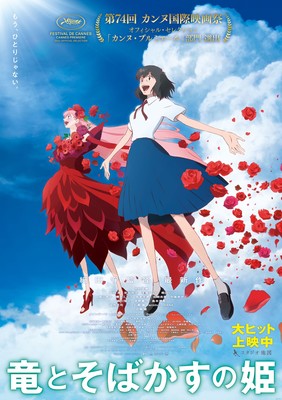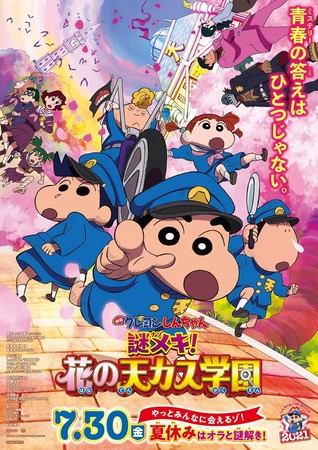
[ad_1]
 My Hero Academia THE MOVIE: World Heroes’ Mission, the third anime film in the My Hero Academia franchise, rose from #5 to #1 in Japan in its fourth weekend. The film earned 204,210,550 yen (about US$1.86) from Friday to Sunday, and has earned a cumulative total of 2,407,196,800 yen (about US$21.9 million). The film has sold 1.81 million tickets as of Sunday. The film is the highest-earning among all three My Hero Academia franchise anime films, surpassing the 1.79 billion yen (about US$16.2 million by current conversion) of the second film, My Hero Academia: Heroes Rising.
My Hero Academia THE MOVIE: World Heroes’ Mission, the third anime film in the My Hero Academia franchise, rose from #5 to #1 in Japan in its fourth weekend. The film earned 204,210,550 yen (about US$1.86) from Friday to Sunday, and has earned a cumulative total of 2,407,196,800 yen (about US$21.9 million). The film has sold 1.81 million tickets as of Sunday. The film is the highest-earning among all three My Hero Academia franchise anime films, surpassing the 1.79 billion yen (about US$16.2 million by current conversion) of the second film, My Hero Academia: Heroes Rising.
The film opened on August 6, and sold about 720,000 tickets to earn about 940 million yen (about US$8.51 million) in its opening weekend.
In the story of My Hero Academia THE MOVIE: World Heroes’ Mission, a mysterious organization dedicated to the destruction of people with Quirks has issued a threat and set bombs all over the world. Pro Heroes and those in Hero Internships scramble to find the bombs. Deku, Bakugo, and Todoroki encounter Rody, a boy living in a mobile home in their designated area of Oseon, and end up working with him.
Original manga creator Kōhei Horikoshi again served as chief supervisor and original character designer. Kenji Nagasaki returned from the television series and two previous films in the franchise to direct the new film at BONES. Other returning staff members include scriptwriter Yousuke Kuroda, character designer Yoshihiko Umakoshi, and composer Yuki Hayashi. Asian Kung-Fu Generation performed the film’s theme song “Empathy” and the film’s insert song “Flowers.”
 Mamoru Hosoda and Studio Chizu‘s new BELLE (Ryū to Sobakasu no Hime, literally “The Dragon and the Freckled Princess”) anime film rose from #3 to #2 in its seventh weekend. The film earned 132,653,100 yen (about US$1.21 million) from Friday to Sunday, and has earned a cumulative total of 5,568,867,200 yen (about US$50.68 million).
Mamoru Hosoda and Studio Chizu‘s new BELLE (Ryū to Sobakasu no Hime, literally “The Dragon and the Freckled Princess”) anime film rose from #3 to #2 in its seventh weekend. The film earned 132,653,100 yen (about US$1.21 million) from Friday to Sunday, and has earned a cumulative total of 5,568,867,200 yen (about US$50.68 million).
BELLE opened in Japan on July 16. The film has IMAX screenings in 38 theaters throughout Japan. This makes BELLE the first of Hosoda’s films to have IMAX screenings. GKIDS licensed the film for North America, and will release the film in English and in Japanese with English subtitles this winter.
Hosoda (The Girl Who Leapt Through Time, Summer Wars, The Boy and The Beast, Mirai) directed and scripted the film, and is also credited for the original work. The film marks Studio Chizu‘s 10th anniversary. Taisei Iwasaki (Blood Blockade Battlefront, Dragon Pilot: Hisone and Masotan, The Naked Director) is the film’s music director and composer.
 The live-action sequel film Kaguya-sama wa Kokurasetai – Tensai-tachi no Renai Zunōsen Final fell from #1 to #3 in its second weekend. The film earned 109,611,700 yen (about US$997,600) from Friday to Sunday and has earned a total of 533,392,800 yen (about US$4.84 million).
The live-action sequel film Kaguya-sama wa Kokurasetai – Tensai-tachi no Renai Zunōsen Final fell from #1 to #3 in its second weekend. The film earned 109,611,700 yen (about US$997,600) from Friday to Sunday and has earned a total of 533,392,800 yen (about US$4.84 million).
The first film sold 1.8 million tickets and earned 2.2 billion yen (about US$20.04 million) during its 2019 run.
The sequel to the first live-action film of Aka Akasaka‘s Kaguya-sama: Love is War (Kaguya-sama wa Kokurasetai – Tensai-tachi no Renai Zunōsen) manga opened on August 20.
The film portrays the events of the original manga’s “Sports Festival and Cultural Festival” arc, focused on Yu Ishigami and Tsubame Koyasu. The arc was also portrayed in the second season of the anime.
The manga inspired a television anime that premiered in January 2019 and aired for 12 episodes. Aniplex of America streamed the series on Hulu, Crunchyroll, and FunimationNow. The company also released the anime on Blu-ray Disc in February 2020.
Kaguya-sama wa Kokurasetai – Tensai-tachi no Renai Zunōsen, the second season of the television anime, premiered in April 2020. Funimation streamed the anime as it aired in Japan. Funimation also dubbed both seasons of the anime.
The anime will get a third season. An original video anime (OVA) project shipped on May 19.
 Earwig and the Witch, Goro Miyazaki‘s anime of Diana Wynne Jones‘ novel of the same name and Studio Ghibli‘s first CG feature, debuted at #8 in Japan.
Earwig and the Witch, Goro Miyazaki‘s anime of Diana Wynne Jones‘ novel of the same name and Studio Ghibli‘s first CG feature, debuted at #8 in Japan.
The film was slated to open in Japan on April 29, but the film’s opening was delayed until further notice due to the new coronavirus disease (COVID-19) pandemic, and eventually opened in Japan on Friday.
The film premiered on Japanese television through NHK General on December 30. Goro Miyazaki‘s father and studio co-founder Hayao Miyazaki are credited for the movie’s planning and development. Studio Ghibli co-founder Toshio Suzuki produced the film.
Jones published the novel in 2011, and it centers on the titular Earwig, who lives in an orphanage. One day she is finally adopted by Bella Yaga and the Mandrake, and her new home is filled with mysterious items, rooms, and a talking cat.
 The live-action film of Ken Wakui‘s Tokyo Revengers manga dropped from #6 to #9 in its eighth weekend. The film earned 59,098,270 yen (about US$537,800) from Friday to Sunday, and has earned a cumulative total of 4,003,312,770 yen (about US$36.4 million). The film has sold a total of 3,012,624 tickets as of Sunday.
The live-action film of Ken Wakui‘s Tokyo Revengers manga dropped from #6 to #9 in its eighth weekend. The film earned 59,098,270 yen (about US$537,800) from Friday to Sunday, and has earned a cumulative total of 4,003,312,770 yen (about US$36.4 million). The film has sold a total of 3,012,624 tickets as of Sunday.
The film was slated to open in Japan last October, but was delayed to 2021 due to the effects of the spread of the new coronavirus disease (COVID-19) in Japan. The production halted filming in April 2020 due to COVID-19. The film opened on July 9. Tsutomu Hanabusa (live-action Kakegurui, Miseinen dakedo Kodomo ja Nai) directed the film. Rock band SUPER BEAVER performed the film’s theme song “Namae o Yobu yo” (I’ll Call Your Name).
Wakui launched the manga in Kodansha‘s Weekly Shōnen Magazine in March 2017. Kodansha Comics is publishing the manga digitally in English. The manga is also inspiring a television anime that premiered on April 10.
 Eiga Crayon Shin-chan Nazo Meki! Hana no Tenkasu Gakuen (Crayon Shin-chan the Movie – Shrouded in Mystery! The Flowers of Tenkazu Academy), the 29th film in the Crayon Shin-chan franchise, dropped from #7 to #10 in its fifth weekend. The film earned 41,067,700 yen (about US$373,700) from Friday to Sunday, and has earned a cumulative total of 1,511,441,050 yen (about US$13.8 million).
Eiga Crayon Shin-chan Nazo Meki! Hana no Tenkasu Gakuen (Crayon Shin-chan the Movie – Shrouded in Mystery! The Flowers of Tenkazu Academy), the 29th film in the Crayon Shin-chan franchise, dropped from #7 to #10 in its fifth weekend. The film earned 41,067,700 yen (about US$373,700) from Friday to Sunday, and has earned a cumulative total of 1,511,441,050 yen (about US$13.8 million).
The film was originally slated to open in Japan on April 23, but was delayed due to the new coronavirus disease (COVID-19) pandemic before opening on on July 30.
The film’s story begins with Shinnosuke and friends experiencing a one-week stay as part of the “defense force” of Tenkatōitsu Kasukabe Private Academy (nicknamed “Tenkasu”), an elite boarding school that is administrated by a state-of-the-art AI. But when Kazama is attacked, with his intelligence reduced, and strange bite marks left on his butt, the mood begins to change. The Kasukabe defense force joins forces with the school’s dropout student council president Chishio Atsuki to form a group of detectives and shed some light on the mystery.
Wataru Takahashi returned from many previous Crayon Shin-chan films as the director, with Kimiko Ueno also returning from 2019’s Eiga Crayon Shin-chan Shinkon Ryokō Hurricane and previous films as the scriptwriter. Macaroni Enpitsu performed the film’s theme song “Hashirigaki” (Scribbling).
The live-action film of Inio Asano‘s A Girl on the Shore (Umibe no Onna no Ko) manga fell from #3 to #4 in its second weekend in the mini-theater ranking. The film opened in Japan on August 20.
Sources: Kōgyō Tsūshin (link 2), Eiga.com, Mainichi Shimbun’s Mantan Web, Cinema Today (須田璃々), comScore via KOFIC
[ad_2]





